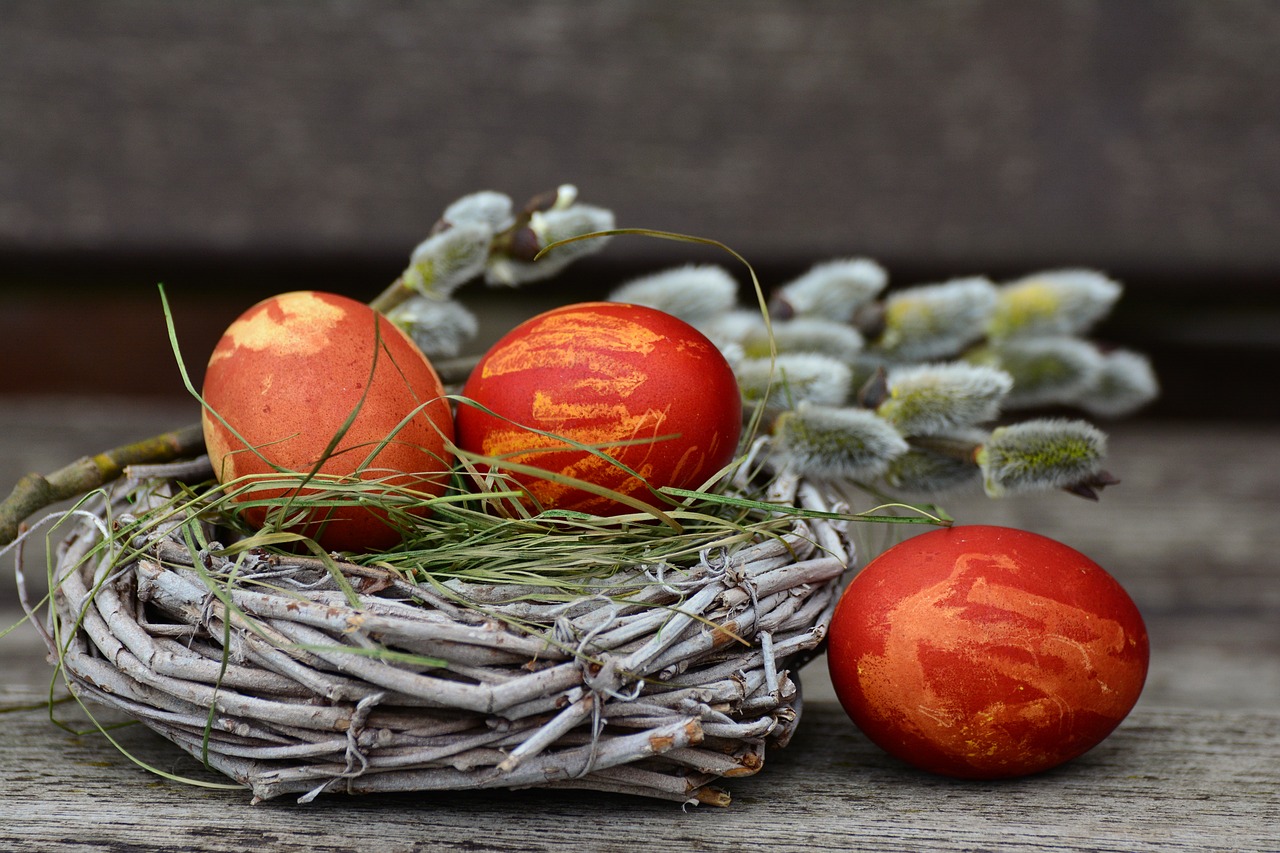Today is Easter Sunday so let’s begin with an Easter story. I have told this before but we have a lot of new members so I get to tell it again. First of all, I have to apologize to any blondes here present – natural or not.
Three blondes died and are at the pearly gates of heaven. St. Peter tells them that they can enter into Heaven if they can answer one simple question. St. Peter asks the first blonde, “What is Easter?” The blonde replies, “Oh, that’s easy! It’s the holiday in November when everyone gets together, eats turkey, and are thankful and stuff…” “Wrong!,” replies St. Peter, and proceeds to ask the second blonde the same question, “What is Easter?” The second blonde replies, “Easter is the holiday in December when we put up a nice tree, exchange presents, and drink eggnog.” St. Peter looks at the second blonde, shakes his head in disgust, tells her she’s wrong, and then peers over his glasses at the third blonde and asks, “What is Easter?” The third blonde smiles confidently and looks St. Peter in the eyes, “I know what Easter is.” “Oh?” says St. Peter, incredulously. “Easter is the Christian holiday, that coincides with the Jewish celebration of Passover. Jesus and his disciples were eating at the last supper. Then the Romans took him to be crucified and he was stabbed in the side, made to wear a crown of thorns, and was hung on a cross with nails through his hands. He was buried in a nearby cave which was sealed off by a large boulder.” St. Peter smiles broadly with delight. Then the third blonde continues, “Every year the boulder is rolled away and Jesus comes out…and, if he sees his shadow, there will be six more weeks of basketball.”
At least I didn’t ask you what you call a line of 10 rabbits walking backwards – a receding hairline.
Easter is regarded in Christianity as the most important feast in the liturgical calendar. So why is it so enduring? The Protestant clergyman and academic, Douglas Horton, wrote, “On Easter Day the veil between time and eternity thins to gossamer.”
In the fundamental churches, this is a day of celebration to commemorate that Christ rose from the dead after three days. To my knowledge, there is no evidence to support that this happened at this time of year. Rather, once again, the Church chose to utilize an existing pagan festival to make the transition easier to a Christian feast day.
It is believed that the word Easter probably derived from the pagan goddess, Oestre. It is interesting to note that the countries with Germanic-based languages use the term Easter, but not the countries of the romantic languages (and also Greece): in Spanish, Easter is known as Pascua; in French, Pâques. These words are derived from the Greek and Latin Pascha or Pasch, a translation of Pesach in Hebrew for Passover. Jesus’ crucifixion and resurrection occurred after he went to Jerusalem to celebrate Passover, the Jewish festival commemorating the ancient Israelites’ exodus from slavery in Egypt.
But Easter is not one day. Rather, it is an entire season from Ash Wednesday to Easter Sunday, and the final week of the season – from Palm Sunday – is known as ‘Holy Week’. From a metaphysical perspective, one interpretation suggests that Palm Sunday represents our human emotions. It asks us to review our expectations, our hidden agendas and beliefs, both positive and negative, and to do so with humility. Each of the days is rich with symbolism culminating in the extinguishing of all light from the church by Easter Saturday, the blessing of the Easter fire and the lighting of the Pascal candle representing the risen Christ. Spy Wednesday (the day Judas betrayed Jesus) challenges us to look at the ways we betray ourselves each time we react or make the same enslaved choices. Passover, or Good Friday, is the time in which all forms of slavery are addressed. We are asked to look at the many ways in which we are enslaved (addicted) to our negative beliefs and emotions. We are challenged to examine (cross-examine if you will pardon the pun) how a belief in bitterness (anger. hate, blame, shame) will ensure we stay stuck in the past, and we are invited to release every person, or experience, that we still have negative feelings about. We are invited to forgive them although, ultimately, we are striving to forgive ourselves. (“Forgive them Father for they know not what they do”) We ‘die’ to our old ego self, so that we can be ‘re-born’ in the Light and Love of Christ Consciousness.
Easter is the Celebration of our New Choice; a choice to free ourselves from the past; to rise above our negative emotions, and to bring an awareness than nothing or no-one can entomb or enslave us unless we allow it. We celebrate the life of Jesus who embodied Christ Consciousness and demonstrated how to live life lovingly, to forgive completely, and how to ‘rise-above’ negativity in any form. We rejoice as we ‘rise again’ from the ashes of our old self and commit to living our life with more Love, Light and Joy.
So perhaps the appeal of Easter is exactly what we have been talking about these last few weeks: vulnerability and authenticity. In this story, we not only see a very vulnerable man going through very human experiences – we see the son of God having trials and tribulations; even the son of God is betrayed, abandoned by his own father, but nevertheless responds with love and forgiveness. This is a story of hope, of getting back up over and over no matter how difficult the challenges – the crosses we are given to bear. Combined with the Spring season – as Laurence Binyon put it, “Nothing is certain, only the certain Spring” – this narrative is even more powerful as it reinforces the paradigm of death, destruction, and rebirth: a reminder that no matter how dark the moment, there is a light at the center of our being that can never be extinguished.
Finally, I know I have read this before but I love this quote from the Lewiston Tribune, author unknown:
Easter is not a time for groping through dusty, musty tomes or tombs to disprove spontaneous generation or even to prove life eternal. It is a day to fan the ashes of dead hope, a day to banish doubts and seek the slopes where the sun is rising, to revel in the faith which transports us out of ourselves and the dead past into the vast and inviting unknown.
Easter is the most important religious holiday in the Christian churches. Phillips Brooks, Episcopal Bishop of Massachusetts in the early 1890s, and who is remembered mainly as the lyricist of O Little Town of Bethlehem, wrote:
“Let every man and woman count himself immortal. Let him catch the revelation of Jesus in his resurrection. Let him say not merely, “Christ is risen,” but “I shall rise.””
This is the promise of Easter, subverting the fear that anything is final, especially death, and giving hope that life goes on. Today, let us be thankful for this reminder that we are simply eternal spirits that are having a series of diverse adventure in this human body to expand the experience of our Divine Source.
I am going to finish this morning with a quote by Seneca (ca. 4BC – 65AD), the Roman philosopher and statesman, who said:
“Every new beginning comes from some other beginning’s end.”
Page | 3


